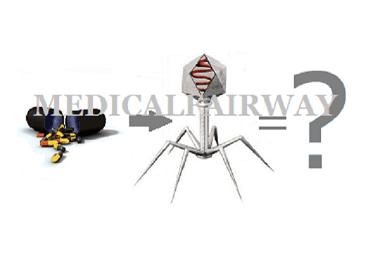Interesting >>>> Can bacteriophages become an alternative to antibiotics?
Can bacteriophages become an alternative to antibiotics?

In 1917, D'Herrelle, a French microbiologist, made an amazing discovery that set a new direction in the fight against bacterial infection. He discovered a bioagent that dissolves bacteria. Subsequently, this discovery was supplemented by other scientific developments, as a result of which it was possible to find out that the found bioagent is nothing more than a virus for bacteria. A bioagent that dissolves bacteria is called bacteriophage (that is, "devouring bacteria", from the Greek "phagos" - devouring). Further studies of this phenomenon led scientists to the creation of a nomenclature of bacteriophages, the essence of which was as follows: the groups of bacteriophages differ in the types of bacteria on which they "parasitize" while continuing their genus. Each type of bacteria contains special receptors for the adsorption of only a certain type of phage, which causes their death. But in the bacterial population, there are so-called phage - resistant individuals, which remain completely viable, despite the presence of bacteriophages. The bacteriophages themselves cannot live and reproduce without the host bacterium.
Although bacteriophages were discovered before antibiotics, they were not widely used in medical practice in those years. They were mainly used to determine the contamination of the studied environment (for example, water bodies) with certain colonies of bacteria and to prevent epidemics.
Today, microbiology and medicine are considering the possibilities of the global use of the bacteriophage in the treatment of bacterial infections, but this direction is complicated by several factors. First, not all bacteria, even those suitable for the type of bacteriophage, die (as mentioned above, some individuals are resistant). Secondly, the effect of a bacteriophage on bacteria is highly specialized, that is, bacteriophages developed for one territorial segment will not necessarily work in another territorial segment, since the strains of bacteria of the same species may differ there. Thirdly, not all bacteria have yet been found corresponding phages.In this sense, antibiotics are in a better position. They are not as selective and can act detrimental to a wide range of bacterial strains. But there is another, negative side to this success. Over time, bacteria tend to acquire resistance (resistance) to antibiotics, but they do not develop such resistance to bacteriophages. In addition, bacteriophages have a destructive effect only on a certain type of bacteria, under which they are bred, and antibiotics kill all living things in their path, including bacteria vital to the human body.
Compared to antibiotics, bacteriophages have many advantages:
- it is a natural remedy to fight bacteria
- do not cause side effects
- compatible with all drugs
- are not allergens
- not addictive
- acting deadly on a certain type of bacteria, they leave all other bacteria alive and thereby do not cause dysbiosis
In order for phage therapy to take a certain place in the fight against infections and be effective, all these conflicting capabilities of the two agents (bacteriophages and antibiotics) should be taken into account in the construction of tactics for treating bacterial infections.
The doctor needs to take into account the fact that if we are talking about a non-acute infectious process, and there is no threat to the patient's life, when asking himself about the drug of the first choice to achieve successful results in the treatment of various bacterial infections, then he can opt for bacteriophages. Their use is considered especially successful as an adjunct to antibacterial medications.
In modern medical practice, bacteriophages are classified as immunobiological drugs. They are available in liquid form, in the form of tablets and sprays. Methods of application - application, introduction into cavities, rectally and orally. Possible areas of application of bacteriophages in the medical industry are more than extensive. These are gastroenterology, urology , gynecology , otolaryngology , pulmonology, surgery.
Bacteriophages have been found for the following bacteria: Pseudomonas aeruginosa, hemorrhagic septicemia, dysentery, Klebsiellosis, salmonella, staphylococcal, streptococcal, coli, typhoid fever, plague, cholera, as well as bacteria of the genus Pseudomonads, Proteus, Escherichia and others. In total, about a hundred species of phages were found.
Before including bacteriophages in the course of treatment, the doctor must be able to select and combine them depending on the bacteria strains found during the examination.
As an example, we will list some variants of the selection of phages for certain infections.
With monoinfections:
- Escherichia coli (bacteriophages: Coliprotein, Koli, Polyvalent pyobacteriophage , Combined pyobacteriophage, Intesti-bacteriophage and their forms in tablets);
- Enterococcus ( Intesty-bacteriophage );
- Staphylococcus (bacteriophages: Staphylococcal , Intesti, Polyvalent pyobacteriophage, combined pyobacteriophage and their forms in tablets);
- Streptococcus (bacteriophages: Streptococcal liquid , Pyobacteriophage combined liquid, Pyopolyphage in tablets);
- Pseudomonas aeruginosa (bacteriophages: Pseudomonas aeruginose liquid , Pyobacteriophage combined liquid, Pyobacteriophage polyvalent purified liquid, Pyopolyphage tablets, Intesty);
- Klebsiella pneumonia (bacteriophages: Klebsiella pneumonia, Klebsiella polyvalent, Pyobacteriophage polyvalent purified liquid );
- Proteus mirabilis and vulgaris (bacteriophages: Proteus liquid, Coliprotein liquid, Coliproteophage in tablets, Pyobacteriophage combined liquid, Pyobacteriophage polyvalent purified liquid, Pyopolyphage in tablets, Intesty).
With co-infections:
- Enteropathogenic Escherichia coli, Proteus vulgaris and mirabilis ( Coliprotein liquid bacteriophage, Coliproteophage tablets);
- Enteropathogenic E. coli, Proteus vulgaris and mirabilis, Staphylococcus, Enterococci, Pseudomonas aeruginosa ( Intesty is a liquid bacteriophage );
- Enteropathogenic Escherichia coli, Proteus vulgaris and mirabilis, Staphylococcus aureus, Streptococcus, Pseudomonas aeruginosa (Pyobacteriophage combined liquid, Pyopolyphage in tablets).
The rules for taking a bacteriophage - half an hour or an hour before a meal.
If after one or two courses the selected bacteriophage does not produce visible results, then they try to change the phage or stop the phage therapy altogether.
Read more about bacteriophages

Read

Read



























